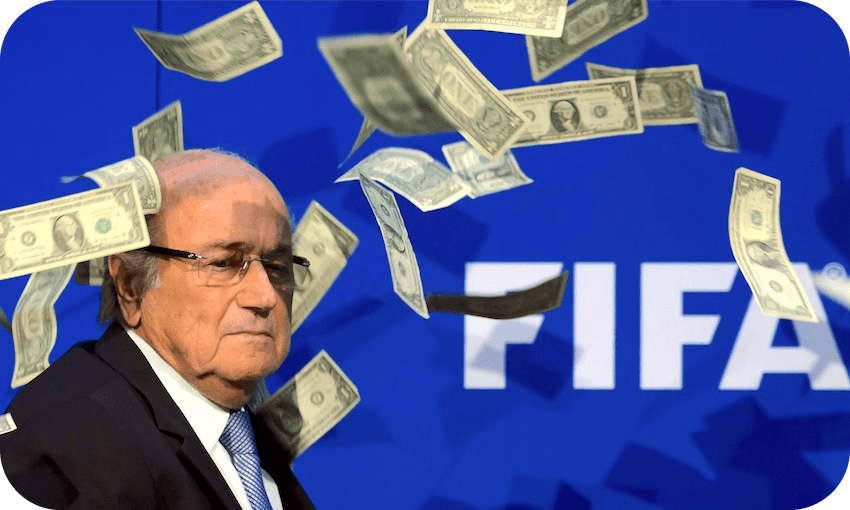The Netflix documentary is an uncomfortable history lesson ahead of next week’s World Cup, writes Catherine McGregor.
This is an excerpt from The Spinoff’s weekly pop culture and entertainment newsletter Rec Room – sign up here.
The 2022 Fifa World Cup will surely go down in history as the most morally dubious sporting event since the end of apartheid. That this year’s tournament doesn’t even come into focus until episode three of Fifa Uncovered is a mark of how deep and pervasive the rot at the heart of world soccer’s governing body really is.
The series is screening ahead of this weekend’s opening ceremony in Doha, and if you’re wondering why a World Cup is happening now rather than at the height of (northern hemisphere) summer when the tournament is usually held, well, good question. The answer lies at the end of a thread of corruption stretching back to 1974, when Brazilian João Havelange was elected Fifa president – with the help, Fifa Uncovered alleges, of numerous brown envelopes of cash delivered to voting nations.
Havelange came into the role with big plans for a parochial organisation that at the time was still being run from a small upstairs office on a Zurich side street. Many of his ideas were positive: he created the women’s World Cup and multiple regional tournaments and programmes that embedded soccer in poor nations across Africa, Asia and the Caribbean, helping transform the sport into the world’s game.
He also oversaw the tidal wave of corporate cash that began flowing into Fifa’s coffers, from the sale of TV rights – more shady arrangements, more kickbacks – and massive brand sponsorships. These deals were pioneered by Havelange’s right-hand man, and eventual successor, Sepp Blatter, a Swiss marketing man who almost single-handedly turned soccer into the most valuable sports product in global history.
As Fifa president, Blatter presided over an orgy of corruption largely centering on Jack Warner, head of soccer’s North, Central American and Caribbean confederation. Along with his sidekick, the marvellously named US sports administrator Chuck Blazer, Warner embarked on a scarcely believable run of bribe-taking, including $10 million in exchange for his votes in support of South Africa’s World Cup bid. That money was ostensibly a donation to fund soccer initiatives for the Caribbean’s African diaspora, the descendants of slavery, but nothing ever came of it. The money went directly into Warner’s pocket.
And so it went on until 2010, when the hosts for the 2018 and 2022 World Cups were decided. If Russia being awarded the 2018 tournament (over the UK, the clear frontrunner) was a shock, the 2022 winner was a complete bombshell. Fifa Uncovered tells how Qatar, a tiny gulf nation with a terrible national team, no football culture to speak of and not a single stadium of its own, used its eye-watering oil wealth to buy votes.
Defending Qatar in the documentary is Hassan al Thawadi, the head of the nation’s bid, who makes decent points about the value of bringing the World Cup to the Middle East for the first time and the racial undertones of some of the criticism – then goes and spoils it all by wiping away hilariously fake tears at the memory of the backlash. This is the chance for the interviewer to go for the jugular, yet when al Thawadi challenges him to name specific instances of corruption, he stumbles, allowing the Qatari to shrug off the allegations as coincidence and sour grapes.
It’s a frustrating moment, but elsewhere Fifa Uncovered does a great job of laying out the shameless venality and abuse underlying this month’s tournament. It’s important that everyone is aware of the human rights violations – against women, the LGBTQ community and, perhaps most horrifically, migrant workers – that remain facts of life in Qatar. Facts that Fifa members conveniently ignored in 2010, blinded by the dollar signs that are now an unavoidable part of the business of soccer.
Fifa Uncovered culminates with the 2015 raid on Fifa’s Zurich HQ at the direction of the FBI in New York. All told, 41 people were arrested and 18 were charged, Jack Warner among them; he still lives a life of luxury in Trinidad & Tobago where he is fighting extradition to the US. For Fifa, the financial corruption may have been reined in but the willingness to turn a blind eye to dictatorships and human rights abuses remains. When the World Cup kicks off next week it’ll be up to the fans to remind Fifa what fairness in sports really means.



